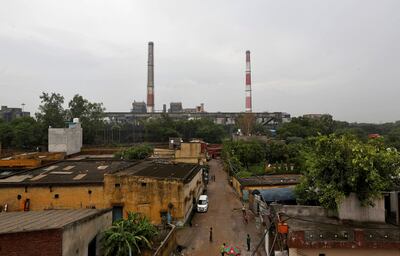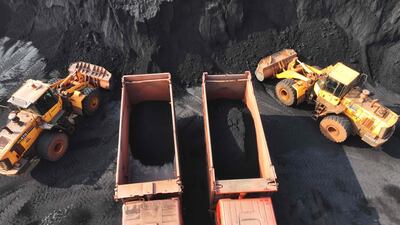Live updates: Follow the latest news on Cop28
Have climate activists forgotten about coal? The attention at Cop28 focuses on language about “phasing out” all fossil fuels, without differentiation. And campaigns relentlessly attack gas, the lowest-carbon of the trio of gas, oil and coal.
Gas is certainly not blameless in the climate problem. It contributes about 22 per cent of global emissions from fuels, after coal at 44 per cent and oil at 32 per cent.
Its main constituent, methane, is a powerful greenhouse gas, and significant amounts leak from wells and pipelines. The petroleum business contributes about a quarter of human-caused methane.
Cop28 has brought progress on cleaning up the gas sector. The UAE put $100 million and six big oil companies $25 million each towards a $255 million World Bank-run fund to help developing countries reduce methane.
As many as 50 oil and gas companies vowed to cut their operational emissions to net zero by 2050, to stop routine flaring of gas, and to bring leaks of methane to near zero by 2030.
Of these, 31 companies made such a pledge on methane for the first time, and more than half of the adherents were national oil companies, who previously were reluctant to sign up.
If fully implemented, the oil and gas industry’s cuts would be equivalent to taking every single oil-fuelled car today off the road.
Gas can be made even cleaner. Conversion to “blue” hydrogen yields a fuel that generates only water and can be a crucial feedstock for industry and low-carbon fuels in ships and planes.
Combustion in new designs of power plants with integrated carbon capture reduces carbon dioxide emissions to very low levels.
The flexibility of gas makes it an ideal complement for variable renewable energy. Entirely renewable-based options for heavy industry remain years from technical and economic viability, while climate campaigners rightly warn us that we have no time to waste in cutting emissions.
But environmental groups cursed, rather than praising, these initiatives. “We need a fast, fair, and equitable fossil fuel phase-out that does not rely on dangerous distractions,” said 350.org.
Green NGOs and sympathetic media have concurred in describing hydrogen and carbon capture as “false solutions”.
Various campaign groups and academics produce purportedly objective, but heavily slanted, analysis, that is picked up credulously by the media.
These usually take worst-case emissions for all possible parts of the value chain and don’t acknowledge any possibility of improvement.
They typically quote the global warming effect of methane over 20 rather than 100 years. This seemingly arcane technical matter has a significant effect on how we evaluate gas versus coal.
Methane is a powerful warming gas but breaks down quickly in the atmosphere. Over 20 years, a tonne of methane has 81 times the warming effect of a tonne of carbon dioxide.
Over a century, though, it is only 27-30 times as much. Using the 20-year figure allows gas opponents to claim that it’s “worse than coal”.
The use of the higher factor may appear careful. But it’s the opposite – it is a reckless gamble with the future.
In the place of methane, which will mostly be gone within 12 years, gas opponents prefer carbon dioxide which will stay aloft for thousands of years – putting the burden on our children, grandchildren and far descendants. Coal produces about twice as much carbon dioxide per unit of energy as gas.
Missing the chance to replace coal with gas today, because gas theoretically won’t be “net zero” decades down the line, is contrary to our scientific understanding of the carbon budget.

The black rock’s other environmental effects are also far worse. Ash, slag heaps, polluted streams, dangerous mines, and the airborne pollutants of sulphur dioxide, nitrous oxides, particulates and mercury.
It’s easy for a professor in front of spreadsheets in New York or California to opine that “gas is worse than coal” when they don’t have to breathe the air in Delhi, Chengdu or Ulaanbaatar.
The shift in environmentalist attention is remarkable. In the early 2000s, gas was seen relatively favourably. The change is for political, not scientific, reasons.
Coal in Western countries is viewed as a vanquished foe. Even though use and emissions remain significant, consumption is down 57 per cent in the US since its 2005 peak, by 61 per cent in Europe since 1985, and by 36 per cent in Australia since 2008.
Two thirds of global coal today is used in China and India, where western NGOs know they have little chance of changing things through public pressure.
“Just Energy Transition Partnerships”, intended to decarbonise coal-heavy developing countries such as South Africa, Vietnam and Indonesia, have run into local political quicksand.
India resists signing up to a JETP, concerned about its effects on coal and domestic energy security and affordability.
Coal miners are seen as victims, not villains. Hit films such as Billy Elliot and Brassed Off, or this year’s documentary King Coal from Appalachia, depict the post-mining struggles of salt-of-the-earth Yorkshire, Geordie and West Virginia folk.
By contrast, few people have an idea of what a gas worker looks like. In the US, it might be associated with the emotive term “fracking”, and campaigns against local earth tremors and allegedly tainted groundwater.
It represents big companies that export liquefied natural gas without paying their fair share of taxes while overcharging Australians.
The gas industry has not done itself favours. It has been far too slow to act on flaring and methane escape. Scientists and NGOs have done a good job of raising awareness of methane leakage, contradicting rosy estimates from the industry, even if some have exaggerated the problem.
The gas business is a central part of the Middle East economy both at home and for export. A viable deal exists. Phase out coal, provide the cleanest possible gas in replacement and move quickly to build up carbon capture to make it truly near zero.
If not, gas companies have to be resigned to being the villain at Cops to come.
Robin M Mills is chief executive of Qamar Energy and author of 'The Myth of the Oil Crisis'


